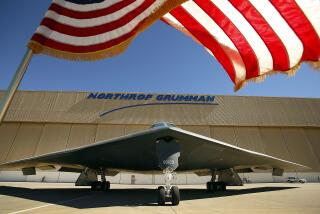Hughes Unit Faces 3-Year Contracts Bar : Aerospace: The government is reacting to Hughes’ guilty pleas to trafficking Pentagon documents. It would be one of the most serious penalties ever against a defense contractor.
- Share via
The Air Force has suspended Hughes Aircraft’s missile systems group in Canoga Park from getting new contracts and is threatening to bar the operation from bidding on new work for up to three years, it was learned Monday.
The government action results from a guilty plea on two felony counts that Hughes entered in federal court last March. Hughes admitted in the case that its executives had trafficked in secret Pentagon documents in an effort to gain competitive advantage.
If the government carries out its threat to bar the Hughes operation, it would be one of the most serious penalties ever imposed against a major defense contractor.
Although many firms have been suspended for a period of time and even threatened with a long-term bar, no major firm is believed to have been barred--or “debarred,” as the Pentagon terms it.
The Hughes missile systems group is headquartered in Canoga Park and has plants in Tucson and LaGrange, Ga. Hughes spokesman Richard Dore said the suspension and proposed debarment would apply only to Canoga Park.
The Canoga Park facility, the research and development center for the missile systems group, has 2,100 employees, mainly scientists and engineers. The group posted sales of $1.3 billion in 1988.
“Obviously, we are very concerned about it,” Dore said. “It doesn’t really have an impact on current programs. At the moment, it is not expected to have an immediate impact on Canoga Park.”
Dore said Hughes is already working to show the Air Force that the missile group is a “presently responsible contractor,” meaning that it has cleaned up its criminal problems. If the unit persuades the Air Force that it is now clean, it might escape a formal debarment, Dore said.
The letter of proposed debarment, which Hughes received last Thursday, was issued by the Air Force “Debarment and Suspension Review Board.”
Even though a long suspension or a debarment would affect only Canoga Park, it could have serious consequences for the long-term health of the group, since its research work provides the basis for future programs.
“There would be nothing to fill in behind the Maverick and AMRAAM programs,” one Hughes source said. “To clip its new business activities could be fatal for the missile group.”
A team of Hughes Aircraft attorneys was in Washington Monday, seeking clarification on the Air Force action, sources said.
The business of Canoga Park and its two factories are “hopelessly” intertwined, in the words of one official--and it is unclear exactly how the suspension is supposed to work.
As a result of the government action, every Hughes division must issue a disclosure statement in new contract proposals that notifies government customers of the proposed debarment, according to a Hughes official.
“It’s a bummer,” said a Hughes official who asked not to be identified. “The typical government contracting officer gets immediately suspicious when he sees that. He thinks the company is a bunch of crooks. The government doesn’t take these things lightly. It is a blot on your record. This is a heavy-duty administrative penalty.”
Indeed, the atmosphere at the Hughes facility Friday was dark. Early in the day, Hughes missile president Ted Wong announced on the public address system that the firm had beaten Raytheon in a major competition to win a $194-million contract. Later, word came on the proposed debarment.
The criminal guilty plea entered by Hughes was part of the large “Operation Undercover” criminal probe, in which GTE, Boeing and RCA also have entered guilty pleas. Air Force spokesman Capt. Jack Giese said late Monday that only Hughes has been issued a notice of proposed debarment.
Giese said Hughes has a 30-day grace period to argue against debarment. He said the Air Force dropped a proposed debarment against the Washington office of Boeing last year after Boeing pleaded guilty to a federal felony in the Operation Ill Wind scandal.
In the Hughes case, the firm admitted that it had acquired numerous classified Pentagon planning documents form 1978 through 1985 and filed them under false titles to conceal them from government auditors.
Prosecutors said the documents were obtained for the company by Frank J. Caso, who retired last year as a marketing executive at the missile group. He could not be reached for comment.
More to Read
Inside the business of entertainment
The Wide Shot brings you news, analysis and insights on everything from streaming wars to production — and what it all means for the future.
You may occasionally receive promotional content from the Los Angeles Times.











